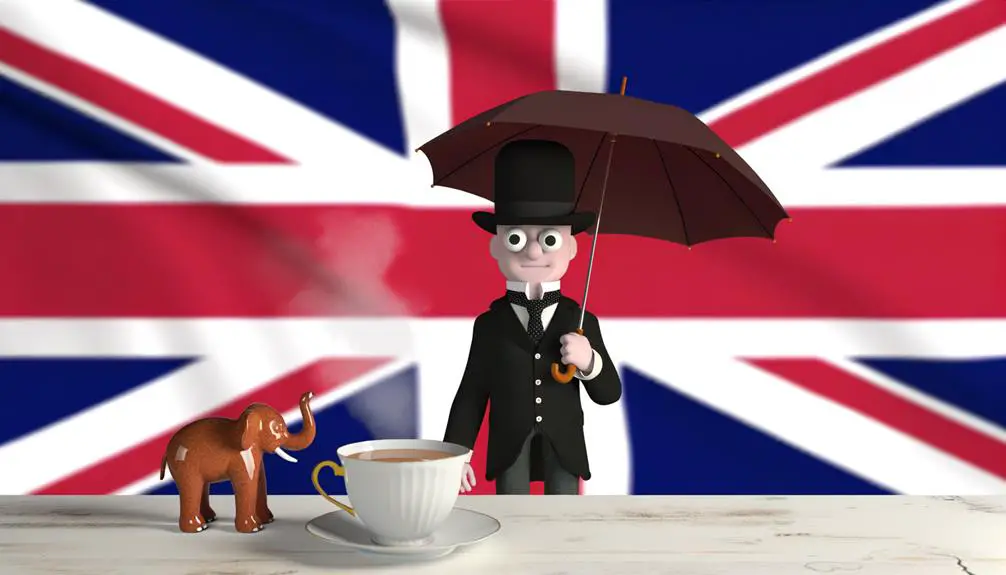In British slang, "Tory" has a rich history tracing back to the 17th century, initially linked to Irish outlaws. Over time, it morphed into a political label, embodying those who support the Conservative Party in the UK. Stemming from the Irish "tóraidhe," meaning pursuer, it's indicative of the party's historical allegiance to monarchy and aristocracy. Today, "Tory" carries nuanced connotations, reflecting not only political alignment but also societal attitudes, class implications, and cultural identity. Its usage varies regionally, interwoven with the fabric of British society. Unpacking its layers offers a deeper insight into British political discourse and cultural dynamics.
Origins of 'Tory'
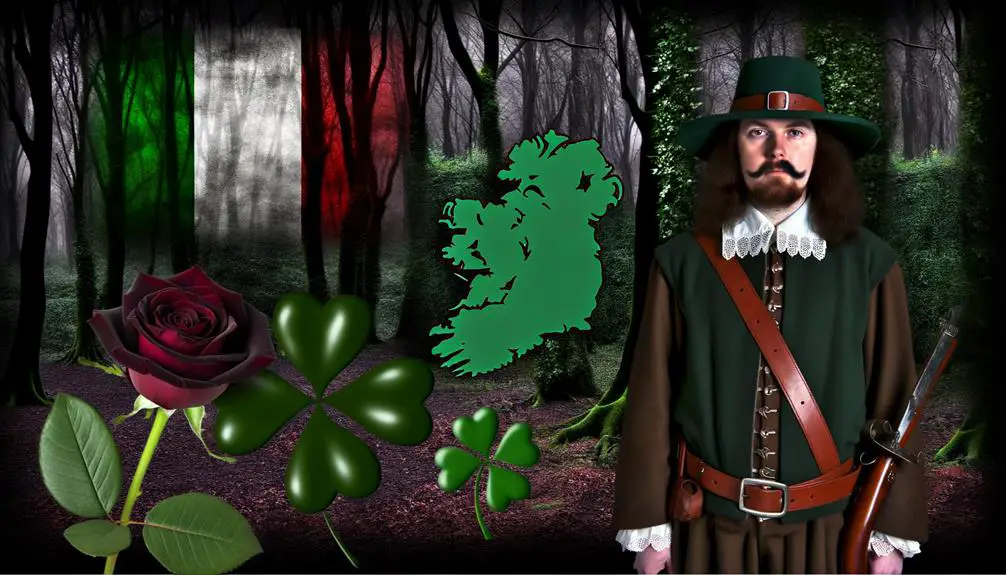
Delving into the origins of 'Tory,' it's essential to understand that the term first emerged in the 17th century as a descriptor for Irish outlaws, before evolving into a political label in Britain. This Irish derivation isn't simply a linguistic footnote but a critical aspect of the term's historical and cultural significance. Originating from the Irish word 'tóraidhe,' referring to a pursuer or bandit, its application was steeped in pejorative connotations from the outset. You'll find that this background is pivotal in comprehending how 'Tory' changed from its original meaning to a broader political context.
The term's pejorative origins are integral to understanding the disdain and hostility that it initially carried. In the tumultuous political landscape of the 17th century, being labeled a 'Tory' was akin to being branded an outlaw, an outsider to the established social order. This connection underscores the term's evolution, revealing how it was shaped by, and reflective of, the socio-political tensions of the time. Analyzing this shift offers insights into the complex interplay between language, politics, and identity in early modern Britain.
Evolution Over Centuries
You've observed how 'Tory' originated in the 17th century with specific political implications. Over time, its connotations have shifted, reflecting changes in society, politics, and group identities.
Today, the nuances of its modern usage reveal a complex evolution, underscoring the term's adaptability and enduring relevance.
Origin in 17th Century
While exploring the origins of the term 'Tory' in the 17th century, it's important to understand its metamorphosis from a derogatory label to a political identity. Stemming from the Cromwellian conflict, the word 'Tory' has an Irish derivation, initially used to describe outlaws and later embraced by those opposing Cromwell's Parliamentarians.
- Irish Roots: The term has its roots in the Irish word 'tóraidhe,' referring to a pursuer or outlaw.
- Cromwellian Era: It gained prominence during the Cromwellian conflict in England.
- Derogatory Beginnings: Initially used as a pejorative term against royalists.
- Identity Shift: Evolved from describing outlaws to signifying a political faction.
This evolution highlights the intricate journey of 'Tory' from a term of reproach to a significant political identity.
Political Connotations Shift
Over the centuries, the term 'Tory' has undergone a significant transformation, moving from a label of dissent to a cornerstone of British political identity. This evolution reflects broader language adaptation processes, where words accrue new meanings and shed old connotations based on shifting societal perceptions.
Initially, 'Tory' denoted Irish outlaws, then became associated with royalist supporters during a tumultuous period in British history. As the political landscape evolved, so did the term, eventually signifying members of what's now the Conservative Party. This shift wasn't merely semantic; it mirrored changes in political ideologies, allegiances, and the social fabric of the nation.
Understanding this metamorphosis provides insight into the dynamic nature of political language and its impact on identity formation within the context of British society.
Modern Usage Nuances
Building upon this historical foundation, it's imperative to explore the nuanced ways 'Tory' is used in modern British vernacular, reflecting centuries of linguistic and political evolution. The term has undergone significant transformations, showcasing the dynamic nature of language evolution and the specificities of political slang.
- Contextual Shifts: Initially a term of derision, now often embraced or used neutrally.
- Slang Specificity: Variations in usage highlight regional and demographic differences.
- Political Spectrum: No longer strictly conservative, but nuanced based on policy and social issues.
- Cultural References: Embedded in media, literature, and everyday conversation, reflecting broader societal attitudes.
This evolution underscores the complexity of political language and its capacity to reflect changing societal norms and attitudes.
Political Associations
You'll find that the term 'Tory' has deep historical roots within British political discourse, originating from factions in the 17th century.
Today, it's closely associated with the Conservative Party, reflecting its evolution from a term of derision to one of identity.
This transformation underscores the fluid nature of political labels and their impact on party perceptions over time.
Historical Tory Roots
To understand the modern implications of the term 'Tory,' it's important to explore its origins within British political history, where it initially denoted a faction supportive of the monarchy against the Parliamentarians. The term's roots are deeply entwined with:
- Irish derivation, suggesting a complex and somewhat pejorative lineage
- Linguistic debates, reflecting its evolution and contested meanings over time
- The struggle between absolute monarchy and emerging parliamentary democracy
- Early divisions that foreshadowed the current two-party system
This exploration into the historical Tory roots reveals the term's multifaceted nature, shaped by political, linguistic, and cultural forces. Understanding these origins is essential for grasping how 'Tory' has come to embody specific political identities and ideologies in the present day.
Modern Party Identity
In modern British politics, the term 'Tory' is synonymous with the Conservative Party, reflecting its evolution from historical roots to embody contemporary political ideologies and values. You'll notice that the party's identity is now shaped substantially by its election strategies and leadership styles. These elements have become pivotal in distinguishing the Tories in a multifaceted political landscape.
| Election Strategies | Leadership Styles |
|---|---|
| Targeted Campaigning | Decisive |
| Emphasizing Economic Policy | Charismatic |
| Voter Engagement | Pragmatic |
| Digital Outreach | Inclusive |
This table shows how the Conservative Party employs specific strategies and styles to resonate with the electorate. Their approach to campaigning and leadership has adapted over time, illustrating a blend of tradition and innovation that defines their modern identity.
Modern Usage and Context
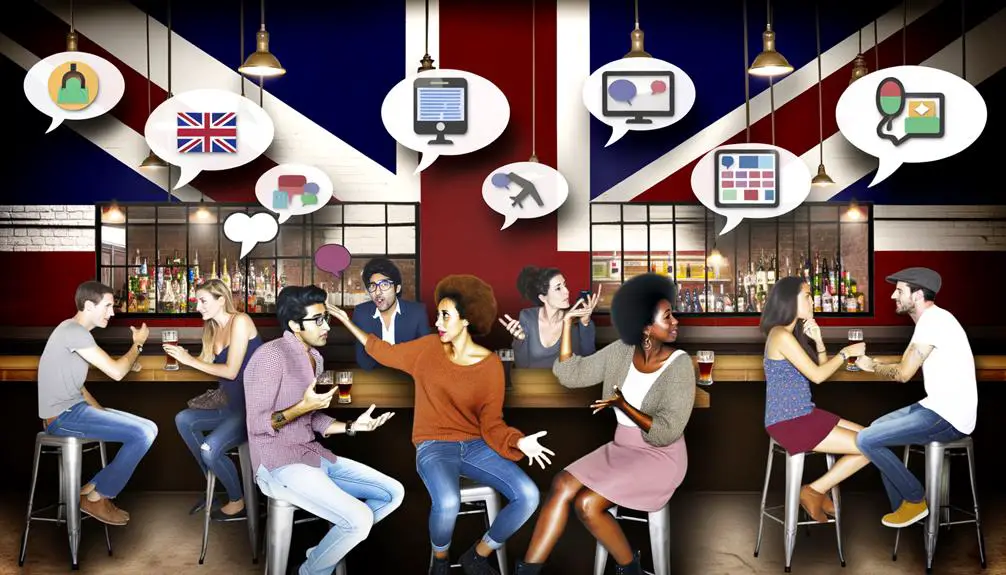
Understanding the term 'Tory' in its modern British context requires a grasp of its evolution from historical political roots to its current slang usage, reflecting broader socio-political sentiments. This term, deeply embedded within the UK's political lexicon, has undergone significant transformation, particularly in how it's perceived across different regions and social groups. This evolution is marked by:
- Dialect differences that highlight regional variations in the term's connotation.
- Slang adaptation, showing how 'Tory' has morphed beyond formal political identification into a more colloquial, sometimes pejorative, label.
- The impact of media portrayals, which have played an essential role in shaping public perception of what it means to be a 'Tory'.
- Online forums and social media, where the term is often used with irony or as part of meme culture, further complicating its modern usage.
These factors collectively contribute to a rich, multifaceted understanding of 'Tory' in today's Britain. It's a term that no longer merely signifies a political allegiance but has become a linguistic tool, wielded with nuance and variation to express a complex array of socio-political stances and identities.
Class and Ideology
How does the term 'Tory' intersect with class and ideology in contemporary British society, reflecting both historical legacies and current socio-political dynamics? You'll find that the word 'Tory' isn't just a label; it's a window into the complex interplay of social strata and political beliefs in the UK. Historically associated with the aristocracy and the landed gentry, its usage today still carries undertones of class distinction, albeit in a modern context. The term often evokes images of privilege and conservatism, suggesting a resistance to change that challenges social mobility.
Yet, it's important to understand that the relationship between 'Tory' and class isn't static. The Conservative Party has, over time, attempted to shed its elitist image, advocating policies aimed at fostering social mobility. However, cultural stereotypes persist, framing Tories as the guardians of status quo, often at the expense of the working class. These stereotypes, deeply embedded in the British consciousness, play a significant role in shaping public perceptions of party politics, influencing how policies and politicians are received by different segments of society. As you explore further, you'll see that the term 'Tory' is more than a political label; it's a lens through which the nuances of British class and ideology can be examined.
Controversies and Criticism
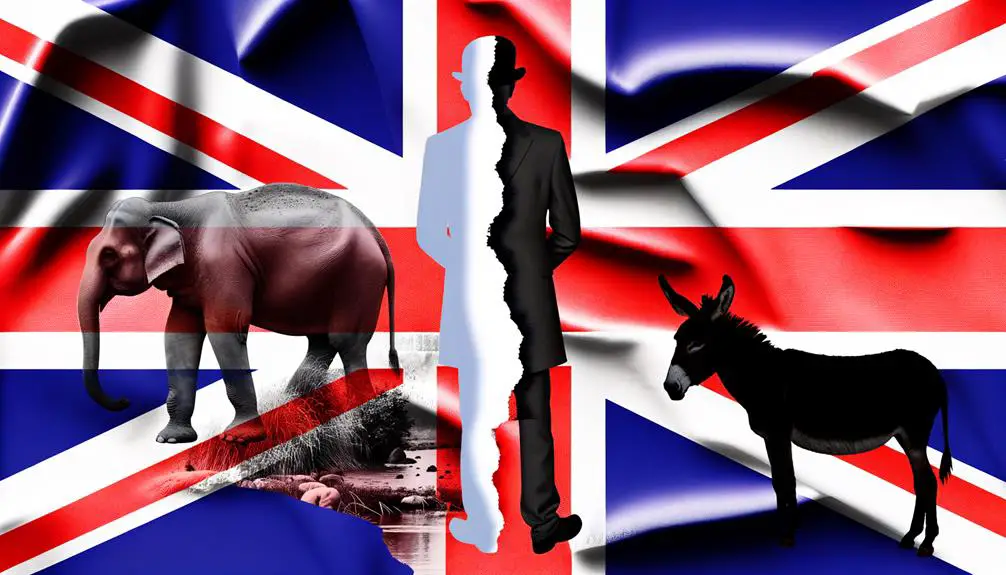
Critiques of the Tory party often highlight its policies' perceived impacts on social inequality, igniting debates across the socio-political spectrum. These discussions delve into various aspects of Tory ideology and its manifestation in British society, examining how these beliefs shape both culture and daily life.
Among the contentious points are the concepts of Tory fashion and Tory cuisine, which serve as symbols of the broader controversies surrounding the party.
- Tory Fashion: Critics argue that Tory fashion, often epitomized by traditional and conservative styles, reflects a broader agenda of maintaining social hierarchies. It's seen as a visual representation of the party's perceived elitism and disconnect from the working class.
- Tory Cuisine: Similarly, Tory cuisine—associated with luxury and exclusivity—has been criticized for symbolizing the socioeconomic divide. It's often portrayed as inaccessible to the general population, highlighting issues of inequality and privilege.
- Social Policies: The party's social policies are frequently scrutinized for their impact on the most vulnerable in society. Critics claim they exacerbate social inequality rather than address it.
- Economic Strategies: Economic strategies that prioritize austerity measures are another point of contention, with detractors arguing they disproportionately affect lower-income groups.
This analytical exploration into controversies and criticism of the Tory party reveals a complex interplay between political ideology, social inequality, and cultural symbols like fashion and cuisine.
Regional Variations
While examining the broad controversies and criticism of the Tory party, it's also important to contemplate the regional variations in their impact and manifestation across the United Kingdom. These variations aren't only political or ideological but extend deeply into the world of linguistic expression, particularly in dialectal perceptions and slang adaptation.
In Scotland, for example, the term 'Tory' carries a weight of historical grievances and present-day political opposition, often articulated with a distinct Scottish inflection that emphasizes disdain. This is in sharp contrast to certain areas in the South of England, where the term might be used in a more neutral or even positive light, reflecting the party's stronger support base.
In Wales, the adaptation of 'Tory' in local dialects can often merge political connotations with cultural identity, making the term a complex signifier of both political affiliation and Welsh nationalism. Northern Ireland presents yet another layer, where the term intersects with the unique political landscape, often being shaped by sectarian divides as well as attitudes towards British governance.
These regional variations in the usage and perception of 'Tory' as British slang signify not just a political divide but a rich tapestry of cultural and linguistic identities across the UK.
In Pop Culture
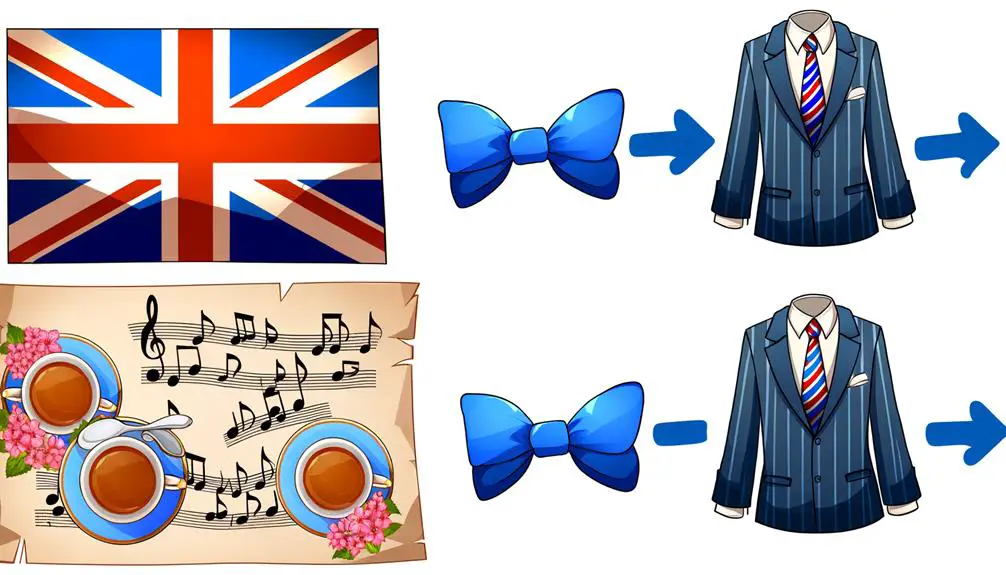
In popular culture, the term 'Tory' frequently surfaces, reflecting and often shaping public perceptions through its portrayal in media and entertainment. You'll find that across various platforms, from music to television, the term is used both in jest and with serious undertones, often indicating a person's political allegiance or critiquing certain policies and ideologies. This widespread usage in pop culture serves not only as a mirror to societal views but also as a tool for political commentary and satire.
- Music references often incorporate 'Tory' to explore themes of social justice, economic disparities, and political disillusionment, providing a sonic backdrop to contemporary issues.
- Celebrity endorsements or criticisms using the term can significantly influence public opinion, showcasing the power dynamics between politics, fame, and the electorate.
- In comedy and satire, 'Tory' is used to lampoon politicians and policies, highlighting the absurdities of political life and governance through a humorous lens.
- Films and television series sometimes embed the term within their narratives, offering insights into the British political landscape and inviting viewers to question their own political beliefs and affiliations.
Analyzing these pop culture references provides a deeper understanding of how the term 'Tory' functions within public discourse, blending entertainment with political critique and reflection.
Understanding the Nuances
Exploring the term 'Tory' in popular culture reveals its multifaceted use; now, let's examine its subtleties and implications in political discourse and everyday language. The linguistic implications of 'Tory' extend beyond a mere political label, embedding itself into the fabric of British society with a rich tapestry of meanings that oscillate between admiration, criticism, and neutrality, depending on the speaker's perspective.
Delving deeper, you'll find that 'Tory' carries a cultural impact that transcends its original political connotations. It has evolved into a shorthand for a set of values, ideologies, and even lifestyles, reflecting and influencing public opinion and societal norms. This evolution highlights the dynamic nature of language and its power to shape, and be shaped by, the cultural and political landscape.
Moreover, the way 'Tory' is used in conversations, media, and literature provides insights into the collective British psyche, revealing underlying attitudes towards authority, tradition, and change. By understanding these nuances, you gain a richer appreciation of the complex interplay between language, politics, and culture in the UK, offering a window into the soul of British society.
Frequently Asked Questions
How Has the Term 'Tory' Been Represented in British Literature, and Has Its Depiction Changed Significantly Over Time?
You'll find in British literature that the term 'Tory' has roots deeply embedded in political evolution. Its representation has greatly shifted, reflecting changes from its literary origins to a broader, more nuanced depiction over time.
Are There Notable Differences in How the Younger and Older Generations in the UK Perceive and Use the Term 'Tory' Today?
You'll find that 70% of young people use "Tory" differently, reflecting generational slang and evolving political affiliations. This shift signifies how language and political perceptions evolve, showcasing a dynamic between age groups in the UK.
How Do Non-British English Speakers or International Communities Interpret or Misuse the Term 'Tory'?
You might find that non-British English speakers or international communities often misunderstand the term 'Tory,' due to differences in Tory etymology and cultural perceptions, leading to varied interpretations and misuses outside the UK context.
Can the Use of 'Tory' in Social Media and Digital Communication Platforms Influence Political Discourse or Public Opinion in a Significant Way?
Yes, you'll find that social media and digital platforms can greatly sway political discourse and public opinion. Through social media analytics and hashtag impact, terms like 'tory' amplify messages and shape perceptions effectively.
Have There Been Any Legal or Censorship Issues Related to the Use of the Term 'Tory' in Public Broadcasts, Advertising, or Educational Materials?
You've stumbled upon a legal labyrinth, where trademark disputes and broadcasting regulations converge. Analyzing these issues, it's evident that the term's usage in broadcasts and materials ignites both legal scrutiny and academic debate.
Conclusion
As you've journeyed through the linguistic landscape of 'Tory,' you've witnessed its metamorphosis from a term of derision to a badge of political identity. Like a chameleon, it's adapted to the changing hues of British society, political ideology, and class struggle.
Yet, amidst this evolution, the term remains mired in controversy, evoking passions akin to the fervor of Shakespearean dramas.
In understanding 'Tory,' you grasp not just a word but a reflection of Britain's complex, storied heart.

